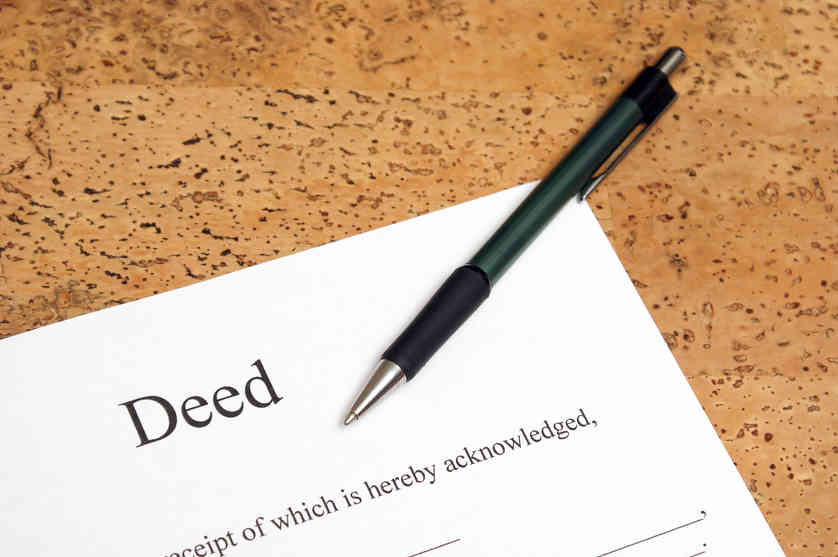Effect of a Disclaimer Deed or Quit Claim Deed in a Divorce in Arizona

Table of Contents
Affect of a Disclaimer Deed or Quit Claim Deed in a Divorce in Arizona
Many people have questions about the affect of a Disclaimer Deed or Quit Claim Deed in a divorce in Arizona.
We are going to talk to you about the effect a Disclaimer Deed or Quit Claim Deed has upon ownership of a home in a divorce in Arizona.
The Arizona Court of Appeals in the case of Bell-Kilbourn vs. Bell-Kilbourn made a decision regarding the effect of a Disclaimer Deed in a divorce in Arizona.
The parties were married on February 15, 2000. After their marriage, the husband and wife bought a home.
They decided to apply for a loan in Wife’s name only because the husband’s credit rating was low.
As a result, the home was titled in Wife’s name only as her sole and separate property.
The husband signed a Disclaimer Deed indicating he waived any community property interest in the home. The Disclaimer Deed also stated the home would be Wife’s separate property.
The parties paid the mortgage with community funds throughout their marriage.
During their divorce, the divorce court ruled that the husband and wife intended the home to be community property when they bought it.
The divorce court also decided the husband did not intend to gift his community property interest in the home to Wife as her sole and separate property.
The divorce court made this ruling despite the Disclaimer Deed signed by the husband stating the property was to be the wife’s sole and separate property.
The wife appealed the divorce court’s decision.

The Community Property Presumption in Arizona is Rebutted by a Disclaimer Deed or Quit Claim Deed
The Arizona Court of Appeals, in this case, started with the presumption that all property acquired during a marriage in Arizona is presumed to be community property.
It also stated that property purchased during a marriage continues to be community property throughout the marriage, pursuant to another court of appeals case of Honnas v. Honnas.
The Arizona Court of appeals, however, also recognized a prior court of appeals decision in the case of Bender v. Bender.
In the Bender case, the court of appeals stated spouses are free to determine the status of their property during a marriage as either sole and separate property or community property.
The Arizona Court of Appeals concluded that the Husband waived his community property interest in the house when he signed the Disclaimer Deed on the home.
The husband argued this case was different from the facts in the Bender case.
Use of Community Funds to Purchase a Home Does Not Change the Effect of Signing a Disclaimer or Quit Claim Deed in an Arizona Divorce
He argued that, unlike the Bender case, community funds were used to purchase this house. The husband argued the Bender case involved a spouse using sole and separate funds to buy the house.
The Arizona Court of Appeals rejected the Husband’s argument.
The Court of Appeals stated the Bender decision was not based upon whether separate or community funds were used to purchase the property.
Instead, the sole existence of a Disclaimer Deed signed by a spouse controls whether a home purchased during marriage is a spouse’s sole and separate property.
The Intention of a Party Signing a Disclaimer Deed or Quit Claim Deed is Not Relevant
The Court of Appeals also noted the husband was not claiming his signing of the Disclaimer Deed was because of fraud or a mistake.
The Arizona Court of Appeals indicated the intention of the parties becomes irrelevant when a Disclaimer Deed is signed.
When a Disclaimer Deed is signed, the plain language of that document controls.
A Disclaimer Deed signed by the husband waiving any community property interest in the home and providing the home will be the wife’s sole and separate property means the home is the wife’s sole and separate property.
The Court of Appeals also rejected the ruling in the case of In Re Sims’ Estate.
The ruling in the In Re Sims’ Estate case allowed a court to consider the intention of the parties when a home is acquired during a marriage.
The Court of Appeals court justified its distinction of the In Re Sims’ Estate case by pointing out that the husband in this case never had an ownership interest when the home was purchased.
The wife rebutted the presumption that the home bought during the marriage was community property by introducing the Disclaimer Deed into evidence.
The burden of proof then shifted to the Husband to present sufficient evidence to establish a community property claim to the home.
A Community Lien Claim May Still Exist Against a Home Even Though a Spouse Signed a Disclaimer Deed or Quit Claim Deed

Although the Arizona Appellate Court confirmed the home as Wife’s sole and separate property, it also concluded the husband has an interest in a “community lien” against the home.
A community lien may exist when community funds were used to pay the mortgage loan on the home or community resources were used to make improvements to the home that increased the value of the home.
The take away from this case is that a spouse who executes a Disclaimer Deed to a home or other parcel of real estate presumptively waives their community property interest in that property.
That spouse has the burden of proving that the signing of that Disclaimer Deed was the result of fraud, mistake or other evidence to establish the home was community property.
The other take away was the recognition of the existence of a community lien against the home. A community lien, however, is not an ownership interest in the home but instead a financial claim made against the homeowner for community money that was spent on the home.
Even then, you should understand that a community lien claim belongs equally to both Husband and Wife.
As a result, the amount of the community lien will be divided equally between the spouses in many cases.
Summary of the Affect of a Disclaimer Deed on a House in a Divorce in Arizona

A person who signs a disclaimer deed waives a community ownership interest in a home in Arizona. The parole evidence rule in Arizona holds that a spouse cannot present evidence, such as testimony, that there was a reason the disclaimer was signed other than an intention to waive community ownership of the home (i.e., because one spouse could not qualify for the mortgage on the home), to dispute the plain language of the disclaimer deed.
The same is true for a spouse who signs a quitclaim deed.
The spouse who signed the disclaimer deed, however, still has a claim for a community lien on the home, which may arguably include the down payment on the home if that down payment was made with community funds. In some cases, the community lien may constitute all or a large majority of the equity in the home which may lessen the financial impact on a spouse who waived a community interest in the ownership of the home by signing a disclaimer deed or quit claim deed.
If you need information about the effect of a disclaimer deed or quit claim deed in a divorce in Arizona, you should seriously consider contacting the attorneys at Hildebrand Law, PC. Our Arizona divorce attorneys have decades of combined experience successfully representing clients in divorce cases in Arizona.
Our family law firm has earned numerous awards such as US News and World Reports Best Arizona Family Law Firm, US News and World Report Best Divorce Attorneys, “Best of the Valley” by Arizona Foothills readers, and “Best Arizona Divorce Law Firms” by North Scottsdale Magazine.
Call us today at (480)305-8300 or reach out to us through our appointment scheduling form to schedule your personalized consultation and turn your Arizona divorce case around today.
Contact Form

Frequently Asked Questions About Disclaimer Deeds:
What happens if I sign a Disclaimer Deed to a house purchased during marriage in Arizona?
You will lose the right to legal ownership of a house if you sign a disclaimer deed to that home during your marriage.
What happens if the only reason I signed a disclaimer deed to my house was to obtain financing?
As a general rule, the fact that you signed a disclaimer deed to obtain financing does not change the impact of the disclaimer deed which results in you assinging that home to your spouse as his or her sole and separate property.
Other Articles About Community Property in Arizona
- ARIZONA COMMUNITY PROPERTY LAWS
- VALUING GOODWILL OF A LAWFIRM IN AN ARIZONA DIVORCE
- COMMUNITY PROPERTY AND ANNULMENT OF MARRIAGE IN ARIZONA
- SOLE AND SEPARATE FUNDS USED TO BUY A HOUSE IN ARIZONA
- DIVISION OF MILITARY RETIREMENT AND DISABILITY PAYMENTS IN AN ARIZONA DIVORCE
- SEPARATE PROPERTY CONTRIBUTIONS WHEN DIVIDING COMMUNITY PROPERTY IN ARIZONA
- PROPERTY HELD AS JOINT TENANTS WITH RIGHTS OF SURVIVORSHIP IN AN ARIZONA DIVORCE
- DIVIDING RETIREMENT ACCOUNTS IN AN ARIZONA DIVORCE
- ARIZONA DIVORCE DEBT
- EFFECT OF PLACING COMMUNITY PROPERTY INTO A FAMILY TRUST IN ARIZONA
- COMMUNITY PROPERTY LOTTERY WINNINGS IN ARIZONA
- IS SEPARATE PROPERTY LIABLE FOR COMMUNITY DEBT IN ARIZONA
- CREDITOR COLLECTING A SEPARATE DEBT WITH COMMUNITY PROPERTY IN ARIZONA
- TITLE AFFECTS COMMUNITY PROPERTY RIGHTS IN ARIZONA
- COMMINGLING SEPARATE PROPERTY WITH COMMUNITY PROPERTY IN ARIZONA
- ARE MILITARY RETIREMENT PAYMENTS COMMUNITY PROPERTY IN ARIZONA
- EFFORT DOES NOT ENTITLE A SPOUSE TO MORE COMMUNITY PROPERTY IN ARIZONA
- RESULT OF COMMINGLING COMMUNITY AND SEPARATE PROPERTY IN ARIZONA
- INCREASED VALUE OF A BUSINESS IN AN ARIZONA DIVORCE
- GIFT OF SEPARATE PROPERTY THROUGH A JOINT TENANCY DEED IN ARIZONA
- ABANDONMENT OF MARRIAGE AND COMMUNITY PROPERTY RIGHTS IN ARIZONA
- ARE PROFITS FROM A SEPARATE BUSINESS COMMUNITY OR SEPARATE PROPERTY
- TRACING SEPARATE PROPERTY COMMINGLED WITH COMMUNITY PROPERTY IN ARIZONA
- INTENTION CONTROLS TRANSMUTATION OF SEPARATE INTO COMMUNITY PROPERTY
- RECORDING A HOME IS INSUFFICIENT TO CHANGE SEPARATE PROPERTY INTO COMMUNITY PROPERTY
- COMMUNITY PROPERTY INTEREST IN A BUSINESS OWNED PRIOR TO MARRIAGE
- WHAT IS SEPARATE PROPERTY IN ARIZONA
- VALUATION AND DISTRIBUTION OPTIONS FOR A PENSION IN AN ARIZONA DIVORCE
- UNFAIR SEPARATION AGREEMENT IN ARIZONA
- UNEQUAL DIVISION OF PROPERTY IN A DIVORCE IN ARIZONA
- SEPARATE PROPERTY USED PURCHSE A HOME DURING MARRIAGE IN ARIZONA
- REIMBURSEMENT FOR PAYING SEPARATE DEBTS OF A SPOUSE IN ARIZONA
- REFUSAL TO SELL A HOUSE AFTER A DIVORCE IN ARIZONA
- PENSIONS AND DIVORCE IN ARIZONA
- MILITARY RETIREMENT PAY AND DIVORCE IN ARIZONA
- IS SEPARATE PROPERTY DIVIDED DIFFERENTLY THAN COMMUNITY PROPERTY IN ARIZONA
- IS ARIZONA A 50-50 STATE IN A DIVORCE
- IS ALL PROPERTY OWNED BY EITHER SPOUSE COMMUNITY PROPERTY IN ARIZONA
- INTEREST ON A LOAN BETWEEN SPOUSES IN ARIZONA
- IMPACT OF IMPROVEMENTS TO SEPARATE PROPERTY IN AN ARIZONA DIVORCE
- HOW TO ENFORCE DIVISION OF PROPERTY AND DEBT IN ARIZONA
- HOW TO DIVIDE PROPERTY IN ARIZONA WHEN A SPOUSE IS HIDING ASSETS
- HOW STOCK OPTIONS ARE DIVIDED IN AN ARIZONA DIVORCE
- HOW IS COMMUNITY PROPERTY DIVIDED IN ARIZONA
- HOW ARE RETIREMENT ACCOUNTS DIVIDED IN AN ARIZONA DIVORCE
- FILING A LIS PENDENS IN A DIVORCE IN ARIZONA
- FAIR COMPENSATION DEFENSE IN AN ARIZONA DIVORCE
- ENFORCE A PROPERTY SETTLEMENT AGREEMENT IN ARIZONA
- DO RULES REGARDING PROPERTY APPLY TO DEBTS IN ARIZONA
- DIVISION OF DEBT IN AN ARIZONA DIVORCE
- DIVIDING PROPERTY NOT INCLUDED IN A DIVORCE DECREE IN ARIZONA
- DIFFERENCE IN COMMUNITY AND SEPARATE PROPERTY IN ARIZONA
- DETERMINING COMMUNITY VERSUS SOLE PROPERTY IN ARIZONA
- CREATION OF A COMMUNITY LIEN ON SOLE AND SEPARATE PROPERTY IN ARIZONA
- COMMUNITY PROPERTY LAWS ABOUT A SPOUSE’S PERSONAL GUARANTEE IN ARIZONA
- CHOOSING A VALUATION DATE WHEN DIVIDING ASSETS IN A DIVORCE IN ARIZONA
- CAN A SPOUSE BE HELD LIABLE FOR CREDIT CARD DEBT IN ARIZONA
- CALCULATING A COMMUNITY LIEN ON A DEPRECIATING ASSET IN ARIZONA
- CALCULATING A COMMUNITY LIEN ON AN APPRECIATING ASSET IN AN ARIZONA DIVORCE
- BANK ACCOUNTS AND DIVORCE IN ARIZONA
- DIVIDING PAID TIME OFF IN A DIVORCE IN ARIZONA
- EQUALIZATION PAYMENTS IN AN ARIZONA DIVORCE
- OMITTED ASSETS IN AN ARIZONA DIVORCE DECREE
- CRSC PAY AND DIVORCE IN ARIZONA
- JUDGMENT FOR SEPARATE PROPERTY STOLEN DURING MARRIAGE
- JUDGE IGNORES A BUSINESS APPRAISAL IN AN ARIZONA DIVORCE
- REIMBURSEMENT OF SEPARATE PROPERTY IN A DIVORCE IN ARIZONA
- SEPARATE PROPERTY INCREASES IN VALUE DURING MARRIAGE IN ARIZONA
- PERSONAL INJURY AWARDS AND DIVORCE IN ARIZONA
- VALUING A BUSINESS IN A DIVORCE IN ARIZONA WITHOUT FINANCIAL DOCUMENTATION
- RETIREMENT INCREASE AFTER DIVORCE IN ARIZONA
- FAILURE TO DISCLOSE FINANCIAL INFORMATION IN A DIVORCE IN ARIZONA
- UNAUTHORIZED USE OF A POWER OF ATTORNEY TO DISPOSE OF SPOUSE’S SEPARATE PROPERTY
- FINANCIAL AGREEMENTS BETWEEN UNMARRIED COUPLES IN ARIZONA
- WHEN A CREDITOR MAY TAKE SOLE AND SEPARATE ASSETS OF A SPOUSE
- LIABILITY FOR A SPOUSE’S NEGLIGENCE IN ARIZONA
- VALUATION OF STOCK HOLDINGS AND DEBT IN AN ARIZONA DIVORCE
- LOANS BEFORE MARRIAGE IN ARIZONA
- CREDITOR LIEN ON JOINT TENANCY PROPERTY IN AN ARIZONA DIVORCE
- INCREASE IN VALUE OF A SEPARATE PROPERTY BUSINESS STOCK IN AN ARIZONA DIVORCE
- STATEMENTS REGARDING PROPERTY ARE BINDING IN AN ARIZONA DIVORCE
- DEBTS NOT INCLUDED IN A DIVORCE DECREE IN ARIZONA
- FRAUDULENT QUIT CLAIM DEED IS INEFFECTIVE IN AN ARIZONA DIVORCE
- DISPOSITION OF COMMUNITY PROPERTY IN A LAST WILL AND TESTAMENT
- DIVIDING BUSINESS PROFITS DURING A DIVORCE IN ARIZONA
- MINORITY DISCOUNT IN A BUSINESS VALUATION IN AN ARIZONA DIVORCE
- HOW A BUSINESS IS DIVIDED IN A DIVORCE IN ARIZONA
- DIVISION OF CIVIL SERVICE RETIREMENT SYSTEM BENEFITS IN A DIVORCE IN ARIZONA
- DISABILITY PAY AND COMMUNITY PROPERTY IN ARIZONA
- VALUATION OF A PROFESSIONAL PRACTICE IN A DIVORCE IN ARIZONA
- JOINING A THIRD PARTY IN A DIVORCE IN ARIZONA
- CONTESTING A RULE 69 AGREEMENT WITHOUT A TRIAL IN ARIZONA
- DEFENSE TO REIMBURSEMENT FOR PAYMENT OF COMMUNITY BILLS IN AN ARIZONA DIVORCE
- SURVIVOR ELECTION AND MILITARY RETIREMENT IN AN ARIZONA DIVORCE
- DEFERRED MILITARY RETIREMENT IN AN ARIZONA DIVORCE
- DIVISION OF DEFERRED RETIREMENT OPTION PLANS IN AN ARIZONA DIVORCE
- CLAIMS OF WASTE IN AN ARIZONA DIVORCE
- DIVIDING ACCOUNTS RECEIVABLE IN A DIVORCE IN ARIZONA
- MINORITY DISCOUNT BUSINESS APPRAISAL IN AN ARIZONA DIVORCE
- FINDING A REALTOR DURING A DIVORCE IN ARIZONA
- WHAT TO DO IF YOUR SPOUSE IS HIDING ASSETS IN A DIVORCE IN ARIZONA
- TYPES OF BUSINESS APPRAISALS IN AN ARIZONA DIVORCE
- BENEFICIARY DESIGNATIONS AFTER DIVORCE IN ARIZONA
- RETIREMENT ACCOUNTS, QDROs, AND DIVORCE IN ARIZONA
- DIVORCE AND REFINANCING A MORTGAGE IN ARIZONA
- PROVING PROPERTY IS SOLE AND SEPARATE IN AN ARIZONA DIVORCE
- 7 REASONS YOU MAY HAVE TO SHARE YOUR INJURY SETTLEMENT IN AN ARIZONA DIVORCE
- PERSONAL INJURY SETTLEMENT IN A DIVORCE IN ARIZONA
- CLAIM OF A SPOUSE’S PERSONAL INJURY AWARD IN AN ARIZONA DIVORCE
- PERSONAL INJURY AWARDS AND DIVORCE SETTLEMENTS IN ARIZONA
- DIVORCE AND PERSONAL INJURY AWARDS IN ARIZONA
- ENFORCING A SURVIVOR BENEFIT ELECTION IN A PENSION IN ARIZONA
- MURDERER SPOUSE AND COMMUNITY PROPERTY IN ARIZONA
- DAMAGES CAUSED BY A COMMUNITY PROPERTY VEHICLE IN ARIZONA
- COMPENSATION FOR WASTE OF COMMUNITY ASSETS IN ARIZONA
- USING SEPARATE FUNDS TO BUY JOINT PROPERTY IN ARIZONA
- TRANSMUTING SEPARATE PROPERTY INTO COMMUNITY PROPERTY BY COMMINGLING
- LIABILITY FOR DEBT GUARANTEED BY THE OTHER SPOUSE IN ARIZONA
- USING COMMUNITY FUNDS TO PAY A MORTGAGE ON A SPOUSE’S SOLE AND SEPARATE HOUSE
- DISCLAIMER DEED AND DIVORCE IN ARIZONA
- COMMUNITY LIEN ON A SOLE AND SEPARATE BUSINESS IN A DIVORCE IN ARIZONA
- YOU’RE GETTING A DIVORCE, ARE YOU SURE YOU WANT THE HOUSE?
- CHANGING JOINT PROPERTY TO COMMUNITY PROPERTY IN ARIZONA
- SEGREGATING SEPARATE PROPERTY FROM COMMUNITY PROPERTY IN ARIZONA
- ARIZONA COMMUNITY PROPERTY LAWS FREQUENTLY ASKED QUESTIONS
